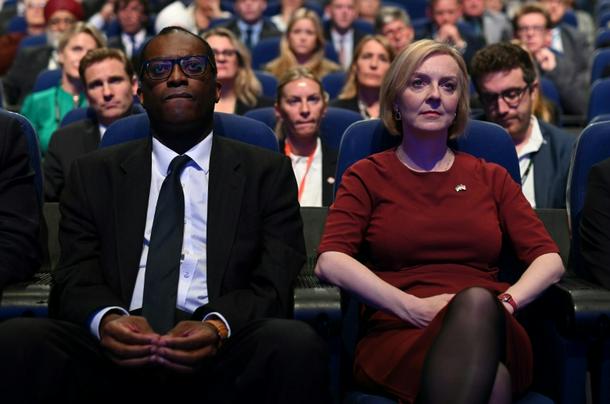
IMF chief Kristalina Georgieva said she had 'constructive' talks with Britain's finance minister and central bank governor
Washington (AFP) - Britain has had its knuckles rapped over its controversial debt-fueled budget at the IMF’s annual meetings, with the crisis lender’s chief urging London on Thursday to maintain “coherent and consistent” policies.
British finance minister Kwasi Kwarteng was already under fire back home when he arrived in Washington for the annual gathering, which Bank of England Governor Andrew Bailey is also attending.
IMF officials – from the institution’s top economist to its managing director – have had their say about Britain’s fiscal choices this week after already warning last month that the measures would increase inequality.
IMF chief Kristalina Georgieva said she had a “very constructive” meeting with Kwarteng and Bailey.
“We discussed the importance of policy coherence and communicating clearly so there can be no – in this jittery environment – there could be no reasons for more jitters,” she said at a news conference.
The UK’s sovereign bonds and the pound have taken a beating on financial markets since Kwarteng and Prime Minister Liz Truss unveiled a “mini-budget” last month that included tax cuts in a bid to ease a cost-of-living crisis.
The move forced the Bank of England, which has been raising borrowing costs to tame inflation, to jump into bond markets to help protect financial stability.
Since then, Kwarteng axed his proposed tax cut for the richest earners and brought forward his debt-reduction plans and economic forecasts to October 31.
The British pound rallied against the dollar on Thursday on reports that the embattled leaders were mulling more U-turns, including on planned changes to corporation tax.
Kwarteng, however, insisted that his “position hasn’t changed.”
“I will come up with the medium-term fiscal plan on the 31st of October, as I said earlier in the week, and there’ll be more detail there,” he told reporters.
He added that Georgieva had told him on Wednesday that he was “quite right to focus on growth.”
- ‘Runaway train’ -
The International Monetary Fund has stressed throughout this week’s meetings of finance chiefs that the priority was for central banks to continue to tighten monetary policies to control inflation and for governments to keep their budgets tight.
“Our message to everybody, not just to the UK, to everybody at this time: fiscal policy should not undermine monetary policy,” Georgieva said.

Britain's finance minister Kwasi Kwarteng (L) and Prime Minister Liz Truss have come under fire over their debt-fueled mini-budget
This would make the task of monetary policy “only harder and it translates into the necessity for even further increase of rates and tightening financial conditions,” she said.
“So don’t prolong the pain and make sure that actions are coherent and consistent.”
While she called for consistency, Georgieva said it was “correct to be led by evidence, so if the evidence is that there has to be a recalibration, it is right for governments to do so.”
The IMF’s chief economist, Pierre-Olivier Gourinchas, said earlier this week that the divergence between BoE monetary policy and government’s fiscal plans was “not going to work very well.”
“It’s like having a car with two people in the front, and each of them is steering the wheel, and trying to steer the car in a different direction,” he said.
Georgieva used more analogies on Thursday as she warned that “we cannot allow inflation to become a runaway train.”
“I’m going to say it again because it is so important for this message to penetrate. When monetary policy puts a foot on the brakes, fiscal policy should not step on the accelerator,” she said.
- ‘A dressing-down’ -
European Central Bank chief Christine Lagarde made a veiled reference to Britain at an event on the sidelines of the IMF meetings where she called for cooperation between monetary and fiscal policies.
“We have seen good and bad examples of what cooperation or lack of cooperation can do,” she said at the annual meeting of the Institute of International Finance.
Susannah Streeter, senior investment and markets analyst at UK asset management firm Hargreaves Lansdown, said that “being given a dressing down by the IMF is never a good look.”
“Such international criticism doesn’t help stem evaporating confidence among investors about the government’s handling of the economy,” Streeter told AFP.
But, she added, it is likely to be “finger-pointing” domestically that would make the UK treasury reassess its tax cut policies.